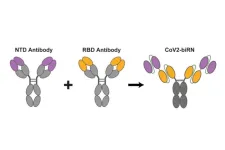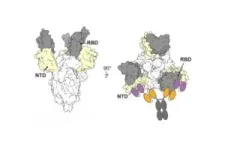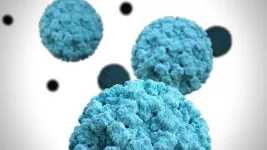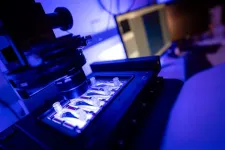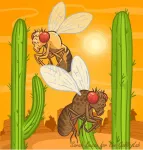(Press-News.org) The virus that causes COVID-19 has been very good at mutating to keep infecting people – so good that most antibody treatments developed during the pandemic are no longer effective. Now a team led by Stanford University researchers may have found a way to pin down the constantly evolving virus and develop longer-lasting treatments.
The researchers discovered a method to use two antibodies, one to serve as a type of anchor by attaching to an area of the virus that does not change very much and another to inhibit the virus’s ability to infect cells. This pairing of antibodies was shown to be effective against the initial SARS-CoV-2 virus that caused the pandemic and all its variants through omicron in laboratory testing. The findings are detailed in the journal Science Translational Medicine.
“In the face of an ever-changing virus, we engineered a new generation of therapeutics that have the ability to be resistant to viral evolution, which could be useful many years down the road for the treatment of people infected with SARS-CoV-2,” said Christopher O. Barnes, the study’s senior author, an assistant professor of biology in the Stanford School of Humanities and Sciences and a scholar at Stanford’s Sarafan CheM-H.
An overlooked option
The team led by Barnes and first author Adonis Rubio, a doctoral candidate in the Stanford School of Medicine, conducted this investigation using donated antibodies from patients who had recovered from COVID-19. Analyzing how these antibodies interacted with the virus, they found one that attaches to a region of the virus that does not mutate often.
This area, within the Spike N-terminal domain, or NTD, had been overlooked because it was not directly useful for treatment. However, when a specific antibody attaches to this area, it remains stuck to the virus. This is useful when designing new therapies that enable another type of antibody to get a foothold and attach to the receptor-binding domain, or RBD, of the virus, essentially blocking the virus from binding to receptors in human cells.
The researchers designed a series of these dual or “bispecific” antibodies, called CoV2-biRN, and in laboratory tests they showed high neutralization of all the variants of SARS-CoV-2 known to cause illness in humans. The antibodies also significantly reduced the viral load in the lungs of mice exposed to one version of the omicron variant.
More research, including clinical trials, would have to be done before this discovery could be used as a treatment in human patients, but the approach is promising – and not just for the virus that causes COVID-19.
Next, the researchers will work to design bispecific antibodies that would be effective against all coronaviruses, the virus family including the ones that cause the common cold, MERS, and COVID-19. This approach could potentially also be effective against influenza and HIV, the authors said.
“Viruses constantly evolve to maintain the ability to infect the population,” Barnes said. “To counter this, the antibodies we develop must continuously evolve as well to remain effective.”
Additional Stanford authors include biology undergraduate Megan Parada; biology staff scientist Morgan Abernathy; life science researcher Yu E. Lee; biology lab technician Michael Eso; biophysics doctoral student Gina El Nesr; and former lab technicians Israel Ramos, Teresia Chen, and Jennie Phung. Barnes is also affiliated with the Chan Zuckerberg Biohub.
Rubio, BS ’21, is also affiliated with the Department of Biology in the School of Humanities and Sciences.
This work also includes co-authors from Rockefeller University, Fred Hutchinson Cancer Center in Seattle, and the Howard Hughes Medical Institute.
This research received support from the Chan Zuckerberg Biohub, Howard Hughes Medical Institute, National Institutes of Health, National Science Foundation, Pew Biomedical Scholars Program, and Rita Allen Foundation.
Rockefeller University has filed a provisional patent application in connection with monoclonal antibodies described in this work on which co-authors Zijun Wang and Michel C. Nussenzweig of Rockefeller University are inventors (U.S. patent 17/575,246). Co-authors Jesse D. Bloom of Fred Hutchinson Cancer Center consults for Invivyd, Apriori Bio, the Vaccine Company, GSK, and Moderna. Bernadeta Dadonaite, also of Fred Hutchinson Cancer Center, consults for Moderna. Bloom and Dadonaite are inventors of Fred Hutchinson Cancer Center-licensed patents related to viral deep mutational scanning.
END
New antibodies show potential to defeat all SARS-CoV-2 variants
2025-03-05
ELSE PRESS RELEASES FROM THIS DATE:
Mental health may be linked to how confident we are of our decisions
2025-03-05
A new study finds that a lower confidence in one’s judgement of decisions based on memory or perception is more likely to be apparent in individuals with anxiety and depression symptoms, whilst a higher confidence is more likely to be associated compulsivity, thus shedding light on the intricate link between cognition and mental health manifestations.
####
Article Title: Metacognitive biases in anxiety-depression and compulsivity extend across perception and memory
Author Countries: Germany, United Kingdom
Funding: TXFS is a Sir Henry Wellcome Postdoctoral Fellow (224051/Z/21/Z) based at the Max Planck UCL Centre for Computational Psychiatry ...
Research identifies key antibodies for development of broadly protective norovirus vaccine
2025-03-05
Scientists at The University of Texas at Austin, in collaboration with researchers from the University of North Carolina at Chapel Hill and the National Institutes of Health, have discovered a strategy to fight back against norovirus, a leading cause of gastroenteritis worldwide. Their new study, published in Science Translational Medicine, identifies powerful antibodies capable of neutralizing a wide range of norovirus strains. The finding could lead to the design of broadly effective norovirus vaccine, as well as the development of new therapeutic antibodies for the treatment of norovirus-associated gastroenteritis.
Norovirus ...
NHS urged to offer single pill to all over-50s to prevent heart attacks and strokes
2025-03-05
The NHS could prevent thousands more heart attacks and strokes every year by offering everyone in the UK aged 50 and over a single “polypill” combining a statin and three blood pressure lowering drugs, according to academics from UCL.
In an opinion piece for The BMJ, the authors argued that a polypill programme could be a “flagship strategy” in Labour’s commitment to preventing disease rather than treating sickness. The programme would use age alone to assess eligibility, focusing on disease prevention rather than disease prediction.
They said such a strategy should replace the NHS Health Check, a five-yearly assessment ...
Australian researchers call for greater diversity in genomics
2025-03-05
A new study has uncovered that a gene variant common in Oceanian communities was misclassified as a potential cause of heart disease, highlighting the risk of the current diversity gap in genomics research which can pose a greater risk for misdiagnosis of people from non-European ancestries.
Led by the Garvan Institute of Medical Research and published in the European Heart Journal, the researchers describe the cases of two individuals of Pacific Island ancestries who carry a genetic variant previously thought to be a likely cause for their inherited ...
The pot is already boiling for 2% of the world’s amphibians: new study
2025-03-05
Scientists will be able to better identify what amphibian species and habitats will be most impacted by climate change, thanks to a new study by UNSW researchers.
Amphibians are the world’s most at-risk vertebrates, with more than 40% of species listed as threatened – and losing entire populations could have catastrophic flow-on effects.
Being ectothermic – regulating their body heat by external sources – amphibians are particularly vulnerable to temperature change in their habitats.
Despite this, the resilience of amphibians to rising temperatures ...
A new way to predict cancer's spread? Scientists look at 'stickiness' of tumor cells
2025-03-05
By assessing how “sticky” tumor cells are, researchers at the University of California San Diego have found a potential way to predict whether a patient’s early-stage breast cancer is likely to spread. The discovery, made possible by a specially designed microfluidic device, could help doctors identify high-risk patients and tailor their treatments accordingly.
The device, which was tested in an investigator-initiated trial, works by pushing tumor cells through fluid-filled chambers and sorting them based on how well they adhere to the chamber walls. When tested ...
Prehistoric bone tool ‘factory’ hints at early development of abstract reasoning in human ancestors
2025-03-05
UCL Press Release
Under embargo until Wednesday 5 March 2025, 16:00 UK time / 11:00 US Eastern time
Prehistoric bone tool ‘factory’ hints at early development of abstract reasoning in human ancestors
The oldest collection of mass-produced prehistoric bone tools reveal that human ancestors were likely capable of more advanced abstract reasoning one million years earlier than thought, finds a new study involving researchers at UCL and CSIC- Spanish National Research Council.
The paper, published in Nature, describes a collection of 27 now-fossilised bones that had been shaped into hand tools 1.5 million years ago by human ancestors.
It’s ...
Study: Vaping does not help US tobacco smokers quit
2025-03-05
Researchers at the Herbert Wertheim School of Public Health and Human Longevity Science and Moores Cancer Center at University of California San Diego have found that, among smokers in the United States, e-cigarette use does not increase smoking cessation and is actually associated with reduced tobacco abstinence. The findings, published March 5 in JAMA, refute the notion that e-cigarettes can help people quit, a common misperception among tobacco users and e-cigarette proponents.
“Most smokers think vaping will help you quit ...
Insect populations are declining — and that is not a good thing
2025-03-05
Insect populations, foundational to food chains and pollination, have dramatically declined over the past 20 years due to rapid climate change
Scientists identify two ways fly species from different climates (high-altitude forest and hot desert) have adapted to temperature
Paper provides evidence that changes in brain wiring and heat sensitivity contributed to shifting preference to hot or cold conditions, respectively
Results may help predict the impact of ongoing climate change on insect distribution and behavior
EVANSTON, Ill. --- Tiny, cold-blooded animals like flies depend on their environment to regulate body temperature, ...
Scientists discover genes to grow bigger tomatoes and eggplants
2025-03-05
Bigger, tastier tomatoes and eggplants could soon grace our dinner plates thanks to Johns Hopkins scientists who have discovered genes that control how large the fruits will grow.
The research—led by teams at Johns Hopkins University and Cold Spring Harbor Laboratory—could lead to the development of new varieties of heirloom tomatoes and eggplants, including those that help support agriculture in areas around the world where local varieties are currently too small for large-scale production.
Findings were published in the journal Nature.
“Once ...
